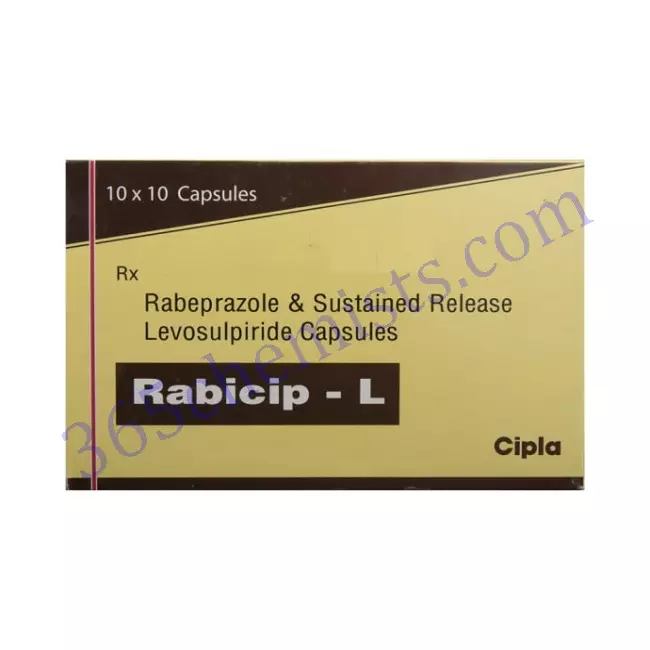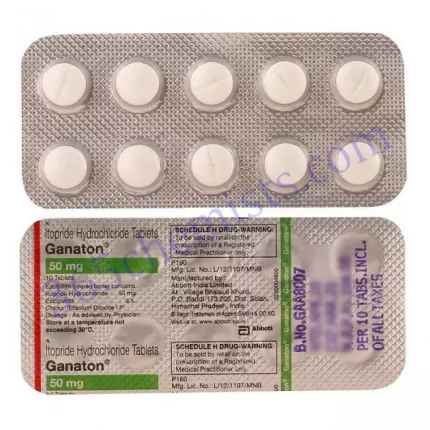Introduction
Levosulpiride and Rabeprazole are the two active components included in Rabicip-L Capsule, a combination drug. Irritable bowel syndrome (IBS), functional dyspepsia, and gastroesophageal reflux disease (GERD) are just a few of the gastrointestinal conditions for which it is frequently recommended. With a dual method of action, this combination treats both the surface symptoms and underlying causes of various illnesses.
How does Rabicip-L Capsule work?
The two drugs in the Rabicip-L Capsule are:
1. Levosulpiride: Levosulpiride is a prokinetic substance that increases gastrointestinal motility and quickens stomach emptying. By preventing the release of acetylcholine, a neurotransmitter that drives muscular contractions, it increases the release of dopamine receptors in the gut. This lessens signs of bloating, nausea, and indigestion as well as the passage of food through the digestive tract.
2. Rabeprazole: Rabeprazole is a member of the proton pump inhibitor (PPI) class of drugs. It functions by preventing the generation of stomach acid, hence lowering the stomach’s acidity. This aids in easing the symptoms of GERD and peptic ulcers, including heartburn, acid reflux, and stomach discomfort. Rabeprazole helps the oesophagus and stomach’s injured tissues repair by reducing the generation of acid.
How to take Rabicip-L Capsule?
Orally, generally before meals, Rabicip-L Capsule should be taken. Your healthcare professional will decide on the dosage and length of therapy based on the disease being treated specifically and how you respond to the medicine specifically. It’s crucial to adhere to your doctor’s recommendations and take the proper dosage as directed.
Instead of chewing or crushing the capsule, it should be completely consumed together with a glass of water. If you have trouble swallowing, you can open the capsule and dissolve the contents in a tablespoon of yoghurt or applesauce before taking a swallow. To get suitable advice on the administration technique, it is crucial to speak with your healthcare physician.
Related product
Rabicip 20mg Tablet
Rabicip-L Capsule
Precautions and Side Effects
It’s crucial to let your doctor know about any existing medical conditions, allergies, or prescription drugs before taking Rabicip-L Capsule. By doing so, the danger of potential interactions or negative effects will be reduced while also ensuring the drug is used safely and effectively.
Headache, lightheadedness, constipation, diarrhoea, and dry mouth are some of the most frequent adverse effects of Rabicip-L Capsule. Although these side effects are frequently minor and short-lived, it is crucial to get medical help if they intensify or continue. Rarely, severe adverse effects like allergic responses, unnatural heartbeats, or movement problems may manifest. Make an immediate appointment with your healthcare professional if you encounter any unexpected or severe symptoms.
Important Considerations and Warnings
Drug interactions: It’s important to let your doctor know about every medication you’re taking, including prescription, over-the-counter, and herbal supplements. The effectiveness of Rabicip-L Capsule may be impacted by drug interactions, which may also raise the possibility of negative side effects. Your healthcare practitioner can evaluate potential drug interactions and modify your treatment plan as necessary.
Special Populations: Rabicip-L Capsule should be used with caution in a few groups, including elderly patients, pregnant or nursing women, people with liver or kidney disease, and pregnant or nursing women. Before giving any drug in certain circumstances, your doctor will weigh the potential risks and advantages.
Allergic Reactions: It’s crucial to steer clear of using Rabicip-L Capsule if you have a known allergy to Levosulpiride, Rabeprazole, or any other component. The symptoms of an allergic reaction to a medicine can range from minor ones like a rash and itching to severe ones like swelling of the face, tongue, or throat and breathing difficulties. If you encounter any symptoms of an allergic reaction, seek emergency medical attention.
Long-Term Use: Rabicip-L Capsule is primarily designed for short-term use to control gastrointestinal disorders and give symptomatic relief. The use of any drug for an extended period of time should be done under the guidance of a healthcare professional because doing so may have dangers and necessitate routine monitoring.
Conclusion
Levosulpiride and Rabeprazole are both beneficial medications for treating digestive issues, and Rabicip-L Capsule combines their effects. It eases symptoms and encourages recovery by increasing gastrointestinal motility and lowering stomach acid production. To be effective, though, the medication must be taken exactly as directed, and you must heed your doctor’s instructions. Consult with your healthcare physician for individualised guidance and recommendations if you have any questions or concerns about Rabicip-L Capsule.
Levosulpiride and Rabeprazole both have advantages that can be combined in Rabicip-L Capsule for the treatment of gastrointestinal diseases. By enhancing gastrointestinal motility and lowering stomach acid production, it relieves symptoms like bloating, indigestion, and acid reflux. However, it’s crucial to take this medication exactly as your doctor prescribes and to adhere to any additional recommendations. Consult your healthcare practitioner if you have any queries or worries about Rabicip-L Capsule for tailored advice and direction based on your unique requirements.












